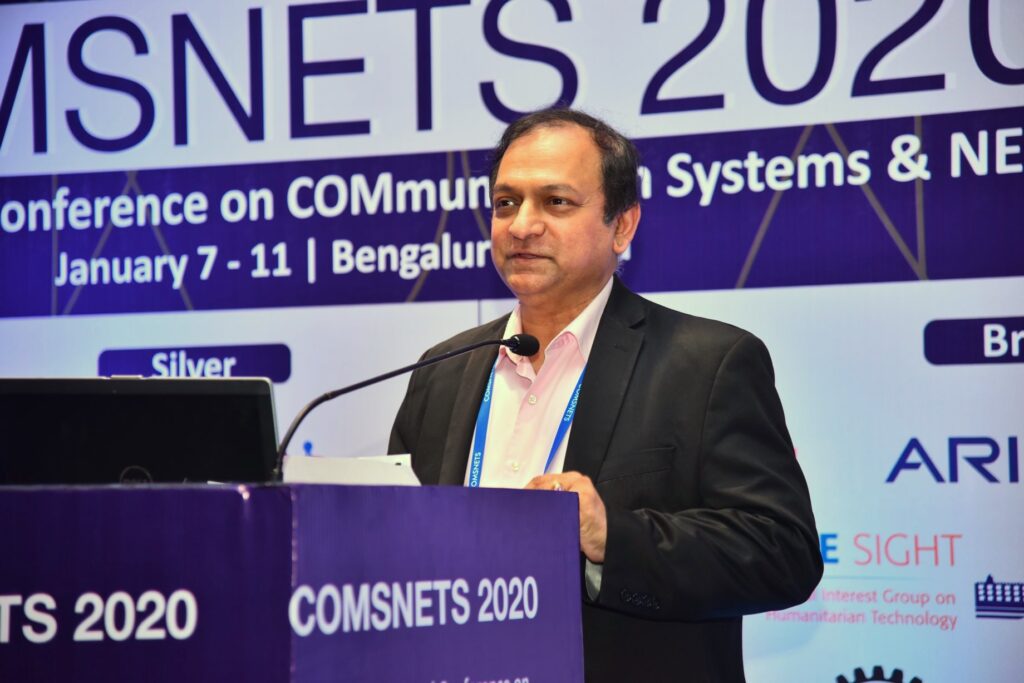The Association for Computing Machinery (ACM), the global computing society with nearly 100,000 members from more than 190 countries, has chartered a Baltimore professional chapter led by employees of the Johns Hopkins Applied Physics Laboratory (APL) in Laurel, Maryland. It will be the only ACM professional chapter in the Baltimore/Washington region, which is home to thousands of computing professionals across leading universities, major companies and government agencies.
The chapter was chartered by ACM on Jan. 27, its founding directed by Ashutosh Dutta (pictured), a senior scientist and 5G chief strategist at APL and seminar chair with the Institute for Assured Autonomy. Dutta will serve as chair of the new Baltimore ACM Chapter, working with a team of officers from APL and Johns Hopkins University (JHU). He has been an ACM member for 25 years and, through his service, has achieved the rank of senior member and ACM Distinguished Speaker.
“We have professionals who come to this region from all over the world, but when I searched for a local ACM chapter, I realized there was a void here. Professionals need a platform for networking and professional development,” Dutta said. He noted that ACM supports collaboration across academia, industry and all sectors, adding, “Our chapter will help community members across the region connect with their peers and learn from and support each other.”
More than 50 APL employees are currently ACM members, including the Laboratory’s director, Ralph Semmel, who was supportive of forming the Baltimore chapter.
“APL actively encourages our staff to participate in professional societies and share their talents and expertise with the community,” Semmel said. “We believe this engagement is central to staff professional development and to the Lab’s goals to share knowledge with the world.”
The Baltimore ACM Chapter is planning a slate of activities for members, such as a monthly seminar, professional meetings and networking events, professional development workshops, and collaboration opportunities with computing organizations and research labs in the region. Those interested may contact Ashutosh Dutta.
ACM’s mission is to advance computing as a science and a profession. The association supports professional and student chapters as well as local special interest groups worldwide that unite colleagues in geographical areas and offer the opportunity to access technological advances and network professionally. In the U.S., ACM backs 48 professional chapters and 503 student chapters.
Johns Hopkins University has long hosted a student chapter of ACM, based in the university’s Computer Science department, one of many colleges and universities in the region hosting student chapters.
“Societies like ACM motivate college students in graduate and undergrad programs to get involved in the professional community and to network,” Dutta said. Maryland currently has 250 student members, DC has 38, and Virginia has 406.
Dutta also serves on the faculty of the Johns Hopkins Engineering for Professionals program, as chair of the Electrical and Computer Engineering program in the Whiting School of Engineering. He said he will look for opportunities for the Whiting School and ACM to partner on events and activities.
ABOUT ACM
ACM, the Association for Computing Machinery, is the world’s largest educational and scientific computing society, uniting educators, researchers and professionals to inspire dialogue, share resources and address the field’s challenges. ACM strengthens the computing profession’s collective voice through strong leadership, promotion of the highest standards and recognition of technical excellence. ACM supports the professional growth of its members by providing opportunities for lifelong learning, career development and professional networking.
BALTIMORE ACM CHAPTER OFFICERS
Chair: Ashutosh Dutta, APL and IAA
Vice Chair: Jeffrey Chavis, APL
Treasurer: Raj Ashar, APL
Secretary: Tamim Sookoor, APL
Webmaster: Random Gwinn, APL
Membership Chair: Ken Schmidt, JHU Department of Computer Science and IAA
